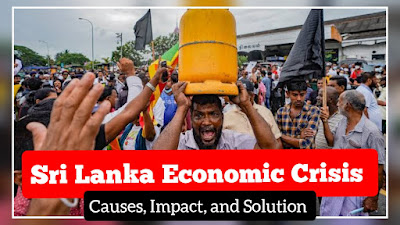Causes and Impact of srilanka economic crises
Sri Lanka is currently facing its worst economic crisis since independence in 1948. The crisis has been caused by a number of factors, including:C
COVID-19 impact on Sri Lanka economy
The pandemic has had a devastating impact on Sri Lanka's economy, as it has on many other countries around the world. The tourism industry, which is a major source of foreign exchange for Sri Lanka, has been particularly hard hit.
War in Ukraine impact on Sri Lanka economy
The war in Ukraine has also had a negative impact on Sri Lanka's economy, as it has led to rising oil prices and food shortages.
Reckless economic policies of Sri Lanka government
The government of Sri Lanka has also been blamed for the crisis, as it has pursued a number of reckless economic policies in recent years. These policies have included:
Currency depreciation in Sri Lanka
In 2019, the government of Sri Lanka cut taxes by a significant amount. This led to a decrease in government revenue, which made it difficult to finance essential services.
Banning chemical fertilizers:
In 2021, the government of Sri Lanka banned the import of chemical fertilizers. This led to a sharp decline in agricultural production, as farmers were forced to use less productive organic fertilizers.
Lack of transparency in Sri Lanka government
The government of Sri Lanka has also been accused of lack of transparency in its economic management. This has made it difficult for the public to understand the true state of the economy and to hold the government accountable.
Role of the international community in helping Sri Lanka
The economic crisis has had a devastating impact on the people of Sri Lanka. The country is facing widespread shortages of food, fuel, and medicine. Inflation has reached record highs, and the currency has depreciated significantly. The crisis has also led to widespread protests and unrest.
The government of Sri Lanka has taken some steps to address the crisis, including:
Negotiating a bailout with the International Monetary Fund (IMF): The IMF has agreed to provide Sri Lanka with a bailout package of $3 billion. This will help the country to repay its debts and to stabilize its economy.
Imposing fuel and food rationing: The government has imposed fuel and food rationing in an effort to cope with the shortages.
Seeking assistance from other countries: Sri Lanka has also sought assistance from other countries, such as India and China. These countries have provided Sri Lanka with food, fuel, and other essential supplies.
The economic crisis in Sri Lanka is a complex and challenging issue. It is not clear how long it will take for the country to recover. However, the government and the people of Sri Lanka are determined to overcome this crisis and to build a better future for their country.
In addition to the above, here are some other things to mention:
The impact of the crisis on the poorest and most vulnerable members of society.
The role of the international community in helping Sri Lanka to recover from the crisis.
The lessons that can be learned from the Sri Lankan experience for other countries.


